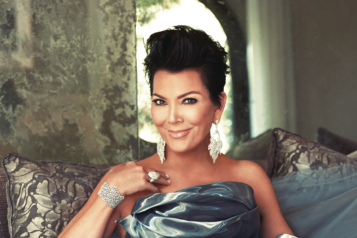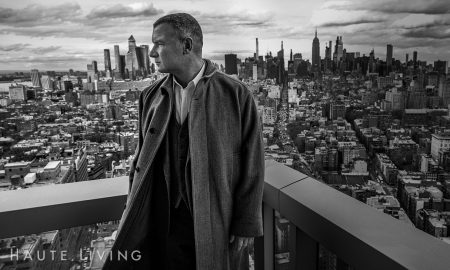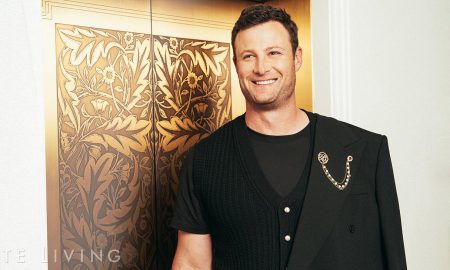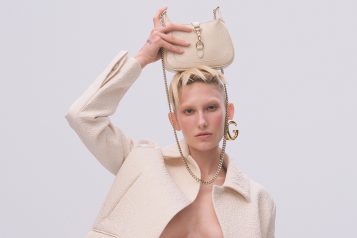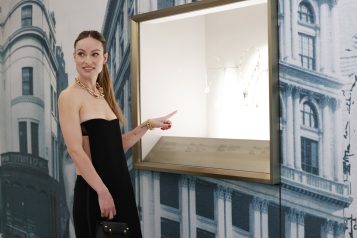
“Do you want to sell sugared water for the rest of your life, or do you want to come with me and change the world?” Steve Jobs famously demanded of John Sculley when wooing him to work at Apple Inc. In contrast, Jeff Daniels didn’t need the full-court press from Aaron Sorkin to play former Apple CEO Sculley in Universal’s upcoming Steve Jobs biopic. After three seasons working with Sorkin on HBO’s The Newsroom, there was simply no other answer but “yes.”
“Aaron and I were winding down on the third season of The Newsroom, and we had heard there was this movie about Steve Jobs that Scott Rudin was producing. We kind of threw it at Scott; Aaron [told him that I] would love to play Sculley, so they put me on the list. Aaron then walked up to me on set one day and said, ‘Do you want to play Sculley?’ I said, ‘Sure,’” he recalls, noting that yes, the answer really is that simple when you have friends in high places.
“We had just spent three years together; I love the guy, and I love saying his words,” he enthuses of Sorkin, adding, “We have a great creative marriage together.”
It’s no accident that the close friendship between Daniels and Sorkin so clearly resembles the legendary bromance of “dynamic duo” Jobs and Sculley (pre-fallout, of course). The latter were friends who finished each other’s sentences, only to part bitterly on irreparable terms after one of the largest shakedowns in business history, leaving Jobs “fired” from his own company as a result.
Because Jobs was so beloved, Sculley has been somewhat villainized in the media—which made accepting said role more challenging—albeit more fun—for Daniels. After landing the pivotal part, the 60-year-old thespian quickly got to work learning about Sculley, and began figuring out how to humanize him. “He’s corporate America with a heart, which, in this divided country, supposedly doesn’t exist,” Daniels says, noting, “[Steve and John] had such a tragic relationship; if it was a Shakespearean play, it would have been a tragedy. They started off with such a bromance! When Steve said, ‘Do you want to spend your life with sugared water, or do you want to change the world?’ John jumped right in. For the first couple of years, it was the two of them—I met John, and that’s what he said—but then he had to make a business decision, and Steve just went nuts on him. It wasn’t a power play—it was John trying to do the prudent thing that was best for the company; they didn’t have a lot of options.”
The business decision Daniels refers to is the sale of Jobs’s flailing baby, the Macintosh, which was underperforming, and, in 1985, only accounted for 30 percent of Apple’s sales. Jobs wanted to lower the price of the Macintosh by 20 percent and, in the interim, to heavily market a computer that no one was buying. When Sculley refused to do so, citing that it would create a bigger financial loss for the company, Jobs decided to simply run the company himself. The end result was an epic boardroom battle where the Apple co-founder was asked to step down from his role managing the Macintosh division. On Sept. 17, 1985 Steve Jobs formally resigned from the organization he co-founded less than a decade prior.
Daniels, who actually met with Sculley in order to better understand the life-changing decision, can certainly see things from the former Apple CEO’s point of view. “John was hanging on to Steve; he hung on to him as long as he could, until it was impossible,” he explains. “He had to make a decision for the business, and then Steve got impossible. Suddenly, they were mortal enemies. There were attempts made by John [to reconcile], but they parted ways and never spoke again. When I met with John and his wife, he said it hurt him in ways that I think he’s now gotten over, but it took many years.”
Though Sculley has since publically admitted that he made the wrong decision, sharing, “If I look back, I say, what a big mistake on my part,” his current clarity makes no difference to how Daniels portrayed him onscreen. “Whether he wants to go back in time is irrelevant to me,” he says.

Daniels deferred to Sorkin and director Danny Boyle entirely on the film’s direction, noting that the Oct. 9 release is completely based on Walter Isaacson’s 2013 bestselling biography. “[The film is] fiction,” he stresses. “We are doing and saying things in places where they did not occur; that’s just the way Aaron has structured this. This is not a documentary; it’s not Steve at 18 or at 56 when he passed away. It’s three different acts taking place with three different launches [including] the iMac and the iPhone.”
Although there will certainly be nitpickers uncomfortable with the sensationalized, edited Hollywood version of Jobs’s life, Daniels sticks by Sorkin’s decision to gloss over the fine-print particulars. “Aaron said to us, ‘Don’t go saying that this didn’t happen at his house, it happened at his office. Don’t start doing that, because you can’t consolidate a 700-page book into a perfect documentary.’
Apple co-founder Steve Wozniak agrees that the adaptation lacks complete precision. After consulting with Sorkin on the script and meeting with his onscreen portrayer, Seth Rogen, he said, “The lines I heard spoken were not things I would say, but carried the right message, at least partly. I felt a lot of the real Jobs in the trailer, although a bit exaggerated…Accuracy is second to entertainment in a movie like this.”
It was also an executive choice to stray away from impersonations of the real-life players, including Sculley, Jobs (played by Michael Fassbender), Wozniak and original Macintosh and NeXT team member Joanna Hoffman (Kate Winslet). “We didn’t want to do impressions,” he declares. “From the beginning, Danny and Aaron said, ‘Play the spirit of the guy, play the intentions of the guy.’ Michael, playing Steve Jobs, isn’t doing an impression of Steve Jobs; he embodies the spirit of Steve Jobs.”
Daniels is quick to note that, while the Steve Jobs cast was loosely mimicking their real life counterparts, they were doing so with an Aaron Sorkin-penned script—meaning there were a lot of lines to learn. As a three-year Sorkin veteran thanks to The Newsroom, he was familiar with the showrunner’s lengthy prose. Fassbender and Winslet, however, were not—and he has nothing but admiration for how quickly they took to it.
As someone who did The Newsroom for three years, you don’t have time to eat. You don’t have time to do anything but rememorize tomorrow’s work. If you’re doing anything else, you won’t be as good tomorrow morning; you just won’t. It’s a complete shutdown of your life to do Aaron Sorkin correctly. [Fassbender and Winslet] just dove in to this monster of a script. I was used to it with The Newsroom, but they weren’t, and Michael kept looking at me going, ‘How did you do this?’ I said, ‘You don’t have weekends.”
He continues, “It’s just repetition, repetition, repetition. You’ve just got to kill it until you’re dancing on top of the words. It takes a lot of work to get there, and an Aaron Sorkin script demands that of you. Actors would kill to be challenged like this.”
AN UNEXPECTED WIN
Let’s take a journey back in time. The date: September 22, 2013. The place: downtown Los Angeles’s Nokia Theatre. The event: the 65th Primetime Emmy Awards. The subject: Jeff Daniels, who had just accepted his trophy for Lead Actor in a Drama Series. The speech: let’s just say it began with, “Well, crap.” The reason: Daniels, a then-first-time nominee, had just upset frontrunners Kevin Spacey and Bryan Cranston by winning his first Emmy for The Newsroom. Needless to say, he had not come prepared.
It all started on the limo ride over. Though Daniels refused to personally analyze his chances of winning that coveted award, he didn’t mind asking Kathleen, his wife of more than 30 years, to do the dirty work for him. “We’re on our way to the Emmys, and I go, ‘By the way, what are my chances?’ She says, ‘It’s between you and Hugh Bonneville from Downton Abbey for fifth and sixth.’ I said, ‘Good, great. Give me some gum.’ I took that gum, started chewing it and thought, Tonight is going to be a long night.”
Note that all the while, Daniels’s gum was his constant for the night; the piece didn’t leave his mouth. Not when he arrived at the Nokia, not when he walked the red carpet and certainly not when the “wrong people” started winning—because when that started happening, he was still thinking he was grateful to be there, and that they would eventually serve food.
“There are all these solid, great shows that [win] year after year, like Breaking Bad and Homeland and Modern Family and Mad Men. Suddenly, it’s Merritt Wever of Nurse Jackie and Tony Hale of Veep and Bobby Cannavale from Boardwalk Empire winning; none of those people were on anybody’s radar. When Bobby won, I remember looking at him—we were in the same row and we were both kind of like, ‘Do we order salmon or steak?’—and then he wins. I look at him, he looks at me and I think, ‘I better get something prepared.’ I had nothing.”
Still chewing his gum, Daniels came up with a backup speech on the fly—just in case. He thought about starting with a quote from the American playwright Lanford Wilson that’s always held personal meaning, about thanking his wife, about starting with a joke—“Oh! The last thing I ever won was Best Actor over 50 for The Squid and the Whale in 2005 from the AARP.”
Surrounded by thousands of Hollywood’s biggest influencers, Daniels watched his speech from The Newsroom—the one that has been viewed on YouTube millions upon millions of times—Will McAvoy’s rant on America that famously begins, “It’s not the greatest country in the world, professor, that’s my answer.” He heard his name called as the winner, and in a fog, stood.
“I got up, made my speech, hit the joke, thanked the people, got the Daniels and Michael Fassbender in Steve Jobs Lanford Wilson quote in, got backstage and realized I was chewing gum. (From l-r): Emily Mortimer, Daniels, True story,” he recollects, with his signature half-smile.
This year, however, things will be different. While he refuses to prepare completely for the awards, he acknowledges that there might be a reason to have at least an outline drafted. “It’s fun to kind of wing it,” he declares. “I encourage everyone who’s going to the Emmys this year to wing it.”
On September 20th, Daniels will face off against fellow Lead Actor in a Drama nominees Kyle Chandler, Jon Hamm, Bob Odenkirk, Liev Schreiber and Kevin Spacey at the 67th Primetime Emmy Awards on FOX. It will be his third consecutive nomination for playing tough, unflinching and unforgettable news anchor Will McAvoy on The Newsroom. This third nod came as a surprise, mostly because Daniels is the kind of guy who doesn’t expect the accolades he so rightfully deserves, citing a variety of excuses for the reasons he might not have been nominated, from “I live in Michigan” to “The Newsroom ended nine months ago; that’s like 10 years ago in TV time.” This year, in fact, he was at his brother-in-law’s place in the Upper Peninsula of Michigan and didn’t check his phone until 10 minutes after the announcement was made—much to his manager’s chagrin. “I knew they were reading the nominations off at 11:30 and finally said, ‘I should probably go check my phone; it’s 11:40.’ It was blowing up. A call came in without caller ID, and it was my manager. He went, ‘Well?’ ‘Well, what, Paul?’ ‘The Emmys.’ I was like, ‘Is there someone who got nominated that you want to trash?’ He goes, ‘You got nominated.’ I was negligent.” He adds, “My family and I are all kind of shaking our heads.”

MR. ANTI-HOLLYWOOD
As you may be able to tell, Daniels is an anti-Hollywood kind of guy. He has never wanted to appear in gossip columns, has always separated himself from the scene by living in his home state of Michigan, and has never stayed in Tinseltown longer than necessary. No, really. “I would take a 9 a.m. plane out of Detroit, land at 11:30 L.A. time, rent a car, do a meeting at 3 p.m., head back to the airport, wait, take the red eye home. I’d never take my coat off, and I did that all the time. A shrink could figure it out. I wasn’t going to commit,” he declares, explaining, “I’ve never felt like I needed to be there. I know it’s cost me money and roles. [With Hollywood] there’s a whole pretense of being seen and being in gossip columns, and I just wanted to be Gene Hackman. I wanted to be Pacino, Hoffman, Newman, De Niro, Redford, Eastwood—all those guys who weren’t everywhere.”
Praise from one of the true greats was important as well. “The one that changed everything was Woody Allen,” he admits. “I was 30 and in the middle of [filming] The Purple Rose of Cairo. I’d been in New York for nine years at that point. I’d done Terms of Endearment and Ragtime, and halfway through filming his movie, Woody told me I was good. That changed everything, because if I was good enough for Woody Allen, then I was good enough for anybody. I met Mike Nichols a few movies later, and went to his place. After talking to him a little bit, I asked if he wanted me to read. He said ‘If you’re good enough for Woody, you’re good enough for me.’ It was a turning point. I knew that if I stayed in the business, I’d make a living. If I was good enough for Woody Allen, I was good enough to make a living, at least, in this idiotic, crazy, cutthroat ‘you’re over on Tuesday’ business.” As if we needed more proof to believe him (he is an award-winning actor, after all), Daniels notes that the experience with Allen was so impactful that he even named his Michigan-based nonprofit, the Purple Rose Theatre Company, after the film he credits most for giving him is confidence.
Although he doesn’t seem like the type to care much about industry accolades, he aspires to earn the same respect that has been awarded to the aforementioned greats, and surprisingly isn’t shy about admitting it. “[Winning] is absolutely thrilling, and it does matter. If you stick around in this business long enough, at some point you want that level of recognition.”
Given that Daniels has been in the business for four decades, starring in box office hits like Speed and Dumb and Dumber, to highly anticipated future openings like Ridley Scott’s The Martian and the third film in the hit dystopian teen Divergent trilogy, Allegiant, it’s no wonder he wants to be appreciated for his work. It’s why he respects and consistently works with men like Sorkin, who inspire and push him to be his very best.
“That’s the fun of it—you’ve got to live up to yourself,” he admits. “[After winning my Emmy for season one of The Newsroom] I said to myself that the trap is: I won’t work as hard in season two. I’m happy to say that didn’t happen; you work harder than ever. Then, maybe you get three nominations. It’s nice to be noticed once in awhile. It’s important that your industry turn[s] to you—maybe just once for a moment—and says, ‘You’re good.’”
Although it may seem surprising that a guy as down-to-earth as Daniels needs validation, it shouldn’t be: on some level, we all seek appreciation for a job well done. As he puts it, “[An award] makes up for all the rejection, all the bad reviews—all the way back to off-Broadway and Broadway—the jobs you didn’t get, the jobs that other guys got that you would have killed to get. At least you’ve got a moment when you can stand there with this piece of gold and say, ‘I’m glad I’m an actor.’ You feel like you’re a member of that club. The trap is that you think your membership is renewed, just because you won once.”
It might be a trap, but Daniels has dug himself out three times in three years; no mean feat for a guy who never expected to be nominated in the first place. “It’s only for a moment,” he continues fiercely. “That’s why a third nomination for The Newsroom surprised me. If you get a moment where you can stand in front of your industry, your peers and some great fucking actors in your category, and you get to hold the hardware just in that moment, it’s complete validation.”








